Steve's reviews and writings
Plants vs. Zombies
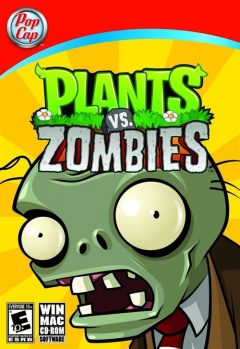 Plants vs. Zombies is a game I've been eyeing for a while. It regularly tempted me at $10 Steam with even cheaper sale prices. This summer's sale finally put me over the edge. Every so
often you need some good tower defense action, and PvZ seemed like a unique yet highly praised take on the genre. Its cartoonish,
Popcap/flash feel and simple five-lane setup makes things perfect for
beginners. And it has enjoyed massive success over a huge variety of
platforms. Originating on PC, PvZ has since expanded to every modern
platform imaginable, both traditional and mobile. Popcap is undeniably a casual gaming powerhouse. The Bejeweled and Feeding
Frenzy creators certainly know how to make products and pricing that
clicks with the average consumer. They've been so successful that EA recently purchased the
company for ~$750 million.
Plants vs. Zombies is a game I've been eyeing for a while. It regularly tempted me at $10 Steam with even cheaper sale prices. This summer's sale finally put me over the edge. Every so
often you need some good tower defense action, and PvZ seemed like a unique yet highly praised take on the genre. Its cartoonish,
Popcap/flash feel and simple five-lane setup makes things perfect for
beginners. And it has enjoyed massive success over a huge variety of
platforms. Originating on PC, PvZ has since expanded to every modern
platform imaginable, both traditional and mobile. Popcap is undeniably a casual gaming powerhouse. The Bejeweled and Feeding
Frenzy creators certainly know how to make products and pricing that
clicks with the average consumer. They've been so successful that EA recently purchased the
company for ~$750 million.For the most part, PvZ exemplifies this success. It creates a casual-friendly atmosphere with calculated progressive learning combined with enough longevity and a tad of optional difficulty to round out the complete package. The game starts slowly, at first holding your hand with only a couple plant options (towers) available to defend your house from a weak zombie horde on a completely barren level. With only five lanes to defend, beginners will learn quickly what it takes to operate. In case they make mistakes, the game includes a get-out-of-jail-free card, in the form of zombie-clearing machines that activate and clear the lane should a zombie make it past the plants. For a while, the game introduces a new plant on almost every level, encouraging the player to try them out and discover what they're worth. Soon enough, juggling several plant types on more obnoxious levels will be a requirement.
The Witcher
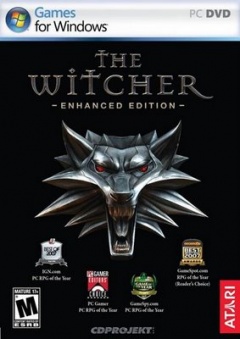 Very rarely do developers aim to make AAA PC exclusives anymore. As one
of the most well regarded action-rpgs in recent history and aided by
numerous recommendations, I felt it was my duty to try The Witcher. Its
developer, CD Projekt, is a Polish firm who's been translating and publishing PC games since the mid-90s. Recently they've been spending money to expand, opening up the RED STUDIO for game development and creating Good Old Games as a DRM-free retro gaming service for modern computers.
Very rarely do developers aim to make AAA PC exclusives anymore. As one
of the most well regarded action-rpgs in recent history and aided by
numerous recommendations, I felt it was my duty to try The Witcher. Its
developer, CD Projekt, is a Polish firm who's been translating and publishing PC games since the mid-90s. Recently they've been spending money to expand, opening up the RED STUDIO for game development and creating Good Old Games as a DRM-free retro gaming service for modern computers.So far, only The Witcher and its sequel have been released by the studio, with Witcher coming out in October 2007 and Assassins of Kings hitting just two months ago (in May 2011). These projects are large in scope, using source material from a Polish novel series and brought to life by large development teams. The Witcher immediately brings a fresh start to the tale as our hero Geralt mysteriously reappears with amnesia, after apparently being killed by an angry mob. So let's see how this story goes. I'm playing the latest version, the Enhanced Edition Director's Cut.
World of Goo
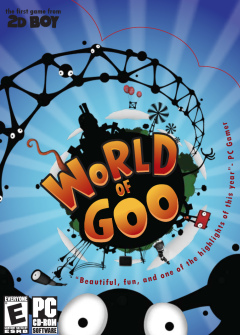 As one of the forerunners of the modern indie game movement (along with Braid), World of Goo demands to be played. Created almost entirely by two individuals on a miniscule budget (2D Boy), it has since gone on to spawn several ports while receiving numerous accolades. I'm a bit late to this party, but its resumé speaks for itself. With incredibly high 90%+ aggregate scores, it has been universally praised as a near-flawless game. Greg has given it a similarly stellar 9/10. PC and Wii first claimed the game in October 2008, followed by OSX in November, Linux in early 2009 and iOS in 2010.
As one of the forerunners of the modern indie game movement (along with Braid), World of Goo demands to be played. Created almost entirely by two individuals on a miniscule budget (2D Boy), it has since gone on to spawn several ports while receiving numerous accolades. I'm a bit late to this party, but its resumé speaks for itself. With incredibly high 90%+ aggregate scores, it has been universally praised as a near-flawless game. Greg has given it a similarly stellar 9/10. PC and Wii first claimed the game in October 2008, followed by OSX in November, Linux in early 2009 and iOS in 2010.All that's left to do is try it out for myself, two-plus years after the fact. Could my personal thoughts and feelings for the game live up to its lofty accolades?
VVVVVV
 Not often will games come along and surprise you these days. In our age
of information, developers and publishers go to great lengths
to push their products. Specifically, they hope to get fans
hyped enough to buy the game day 1 as well as keeping the title in the
public mind for continued spontaneous purchases of their
product. This is why we're rarely surprised and blown away by a game.
For
me, VVVVVV was that type of game.
Not often will games come along and surprise you these days. In our age
of information, developers and publishers go to great lengths
to push their products. Specifically, they hope to get fans
hyped enough to buy the game day 1 as well as keeping the title in the
public mind for continued spontaneous purchases of their
product. This is why we're rarely surprised and blown away by a game.
For
me, VVVVVV was that type of game.Alan Wake
 Alan Wake has been a long time coming. After Max Payne 2 released in
2003, Remedy has
used the majority of their resources for this game. Originally
announced in 2005, it
has naturally undergone significant revisions. Once a freeroaming
affair, Alan Wake is now almost entirely linear. Instead of releasing
on consoles
and PC, Remedy ended up partnering with Microsoft for an exclusive 360
release. As one would expect from a partnership, the game got bigger
and bigger and eventually ended up being a high-profile, big-budget
release when it finally hit in May 2010. Such a big game for a small
company would carry with it many risks and increasingly impatient
onlookers. Is the survival-horror tale worth the wait in the end?
Is the Alan Wake concept still relevant and contemporary enough several
years
later? Most importantly, is the game good and does it work? Let's take
a dive into the darkness...
Alan Wake has been a long time coming. After Max Payne 2 released in
2003, Remedy has
used the majority of their resources for this game. Originally
announced in 2005, it
has naturally undergone significant revisions. Once a freeroaming
affair, Alan Wake is now almost entirely linear. Instead of releasing
on consoles
and PC, Remedy ended up partnering with Microsoft for an exclusive 360
release. As one would expect from a partnership, the game got bigger
and bigger and eventually ended up being a high-profile, big-budget
release when it finally hit in May 2010. Such a big game for a small
company would carry with it many risks and increasingly impatient
onlookers. Is the survival-horror tale worth the wait in the end?
Is the Alan Wake concept still relevant and contemporary enough several
years
later? Most importantly, is the game good and does it work? Let's take
a dive into the darkness...Penumbra: Overture
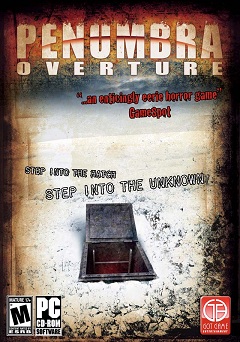 Atmosphere. Danger. Environment. Expectation. These words are
integral to any sort of horror-based media, and yet many have
seemingly forgotten all about the reasons behind fear and instead rely on cheap tactics to do
the job. Penumbra: Overture shows a much more sophisticated ability to
keep players on edge without relying on grotesque visuals and cheap
'jump moments' to elicit responses. I was particularly curious as to
how this game could effect me since I'm not easily frightened and cheap attempts at fear usually seem more humorous
than scary. And overall, the game does a fairly good job at its goals.
Let me explain.
Atmosphere. Danger. Environment. Expectation. These words are
integral to any sort of horror-based media, and yet many have
seemingly forgotten all about the reasons behind fear and instead rely on cheap tactics to do
the job. Penumbra: Overture shows a much more sophisticated ability to
keep players on edge without relying on grotesque visuals and cheap
'jump moments' to elicit responses. I was particularly curious as to
how this game could effect me since I'm not easily frightened and cheap attempts at fear usually seem more humorous
than scary. And overall, the game does a fairly good job at its goals.
Let me explain.Overture almost takes advantage of those modern media shortcuts to create a fully engrossing experience with the capability to be legitimately frightening. As a response to these movies, shows, and games, your mind now expects something to happen when you travel down a dark hallway, into a new room, or when encountering an enemy. Instead, nothing typically happens in Penumbra. In fact, very little "happens" throughout the whole game. Almost all of the happenings and story events involve Phillip sorting out the past of his forgotten surroundings instead of building the story himself or primarily creating a story. At heart, Overture is a first-person adventure game, with the atmosphere as really the only major demarker to the survival-horror tag. I can recall only a handful of actual "events" Phillip was directly involved in. And yet this feels perfectly fine in the context of the game.
Penumbra: Overture
 Welcome to another Audio-Visual Experience, brought to you by the
First Hour. Again, these articles are specially created and intended to
give you a varied, concrete experience of the game's sights and sounds
without having to actually play the game yourself. Whether you haven't
played the game or have already completed it but need a reminder or some
nostalgia, this experience is for you. However, if you think you may
play the game anytime in the near future and would prefer not to be
spoiled, you should probably avoid this article, as it contains direct
spoilers at times, up to and including the ending. For a complete first
hour experience, you can view the first hour of Penumbra: Overture.
Welcome to another Audio-Visual Experience, brought to you by the
First Hour. Again, these articles are specially created and intended to
give you a varied, concrete experience of the game's sights and sounds
without having to actually play the game yourself. Whether you haven't
played the game or have already completed it but need a reminder or some
nostalgia, this experience is for you. However, if you think you may
play the game anytime in the near future and would prefer not to be
spoiled, you should probably avoid this article, as it contains direct
spoilers at times, up to and including the ending. For a complete first
hour experience, you can view the first hour of Penumbra: Overture.So sit back and enjoy the stylings of survival horror masters Frictional Games in their original release, Penumbra: Overture.
Penumbra: Overture
 Just in time for Halloween, we have a special first hour of Penumbra: Overture. Released in 2007 by indie developer Frictional Games,
Penumbra: Overture is the first in a trilogy that promises to be a
uniquely frightening experience. As part survival horror, part puzzle
solver and part first person shooter, initial previews evoke thoughts of
Half-Life 2 infused with terror, which is just fine with us. I've
heard great things about the game for a while, mostly from flattering
word-of-mouth. This is as good a time as any, after purchasing it from
the Humble Indie Bundle several months ago.
Just in time for Halloween, we have a special first hour of Penumbra: Overture. Released in 2007 by indie developer Frictional Games,
Penumbra: Overture is the first in a trilogy that promises to be a
uniquely frightening experience. As part survival horror, part puzzle
solver and part first person shooter, initial previews evoke thoughts of
Half-Life 2 infused with terror, which is just fine with us. I've
heard great things about the game for a while, mostly from flattering
word-of-mouth. This is as good a time as any, after purchasing it from
the Humble Indie Bundle several months ago.For this first hour playthrough, we've trying something a bit different. I played through and recorded the initial first hour and then sent the video to Greg, who then watched and wrote what he saw and felt during the run. I was curious in seeing how his experience would differ from mine, especially since third-person impressions are so important to overall game opinion, especially when it comes to making purchasing decisions. So I'll hand this off to Greg (while adding some extra comments I deem appropriate) and then bring it back for the conclusion.
If you wish, you can follow along yourself with the provided Youtube videos. Apologies about the graphical and slight sound sync issues, but you can blame Youtube for those.
Limbo
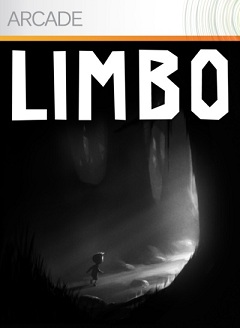 Theologically, limbo exists as a state of divine neutrality, a residence
between heaven and hell. Limbo by Playdead Studios displays this fuzzy
pseudo-reality in its presentation, but with a sinister twist. This
limbo can be cruel, grewsome and even downright evil. Bear traps randomly lie on the
ground, forever waiting just for you alone to trigger them. Giant spiders
hide in caves, hoping you'll wander close enough for them to skewer with their giant
legs. In Limbo, ghost children satisfy their concept of play by setting
up guilottines and buzzsaws to shred you. This game is in no way particularly kind.
Theologically, limbo exists as a state of divine neutrality, a residence
between heaven and hell. Limbo by Playdead Studios displays this fuzzy
pseudo-reality in its presentation, but with a sinister twist. This
limbo can be cruel, grewsome and even downright evil. Bear traps randomly lie on the
ground, forever waiting just for you alone to trigger them. Giant spiders
hide in caves, hoping you'll wander close enough for them to skewer with their giant
legs. In Limbo, ghost children satisfy their concept of play by setting
up guilottines and buzzsaws to shred you. This game is in no way particularly kind.However, that cruel nature only adds to the atmosphere as the player must remain constantly aware of the presense of death in this bizarre, mysterious minimalist world. In this world and state of existence, death is the norm. Beginning as a stylistic proof of concept by a disgruntled game artist named Arnt Jensen, the concept soon flourished into a full game as Jensen subsequently co-founded Playdead Studios with Dino Patti to develop his idea. Originally planned for a PC release, Playdead was able to procure Dutch government grants and investor support while eventually deciding on an Xbox Live Arcade release, likely to avoid piracy worries and possibly for 360 exclusivity bonuses provided by Microsoft. The game eventually released this summer on July 21st during the 360's "Summer of Arcade." So, how does the final product match atmosphere and action? Does the constant presence of death help or hurt player mood and motivation? Let's take a deeper look and try to decide.
Final Fantasy XIV Beta Impressions
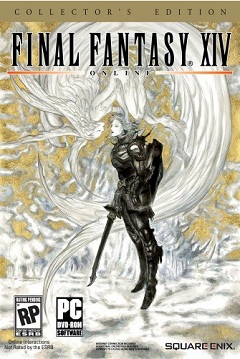 Without question, Final Fantasy XI deviated strongly from MMO
traditions and norms. In doing so, it managed to greatly polarize the
community. By moving at a slow, calculated pace throughout (even for an MMO) and
requiring players to rely on others to accomplish the most simple
goals, many players were forever turned off, including Greg and myself.
Past level 15, players required a party to do any sort of leveling.
Many damage-dealing classes were simply not wanted and sat in the main
city for hours until they could find a group, while tanks, healer and
support classes were welcomed into parties within seconds. The economy was absolutely
broken, with incredible inflation stemming from gil selling and the gap
between rich and poor players. Farming for money (outside of instanced
colliseum-style fights) consisted of sitting at rare spawn locations for
hours along with the other farmers and bots, just hoping that you manage to attack the monster before anyone else and then praying that it would drop
what you wanted. Simply put, the game had a lot of glaring problems that pushed people away.
Without question, Final Fantasy XI deviated strongly from MMO
traditions and norms. In doing so, it managed to greatly polarize the
community. By moving at a slow, calculated pace throughout (even for an MMO) and
requiring players to rely on others to accomplish the most simple
goals, many players were forever turned off, including Greg and myself.
Past level 15, players required a party to do any sort of leveling.
Many damage-dealing classes were simply not wanted and sat in the main
city for hours until they could find a group, while tanks, healer and
support classes were welcomed into parties within seconds. The economy was absolutely
broken, with incredible inflation stemming from gil selling and the gap
between rich and poor players. Farming for money (outside of instanced
colliseum-style fights) consisted of sitting at rare spawn locations for
hours along with the other farmers and bots, just hoping that you manage to attack the monster before anyone else and then praying that it would drop
what you wanted. Simply put, the game had a lot of glaring problems that pushed people away.Years after its original Japanese and subsequent North American release, FFXI began changing significantly, modifying nearly everything and adding features to appear more tempting to the average gamer, especially once under the shadow of MMORPG behemoth World of Warcraft. FFXI has always enjoyed a degree of success, as a profitable long-running MMO with a stable user base. However, it has not gained significant market share either. By hearing customer feedback for the past few years as well as observing current MMO trends, Square-Enix is surely hoping that they'll be able to grab more of that growing market with Final Fantasy XIV. But how much have things really changed? Have they fixed the basic and more complicated issues that people had with XI? I was genuinely curious and tried out the beta for just this reason. Here's what I've found...
